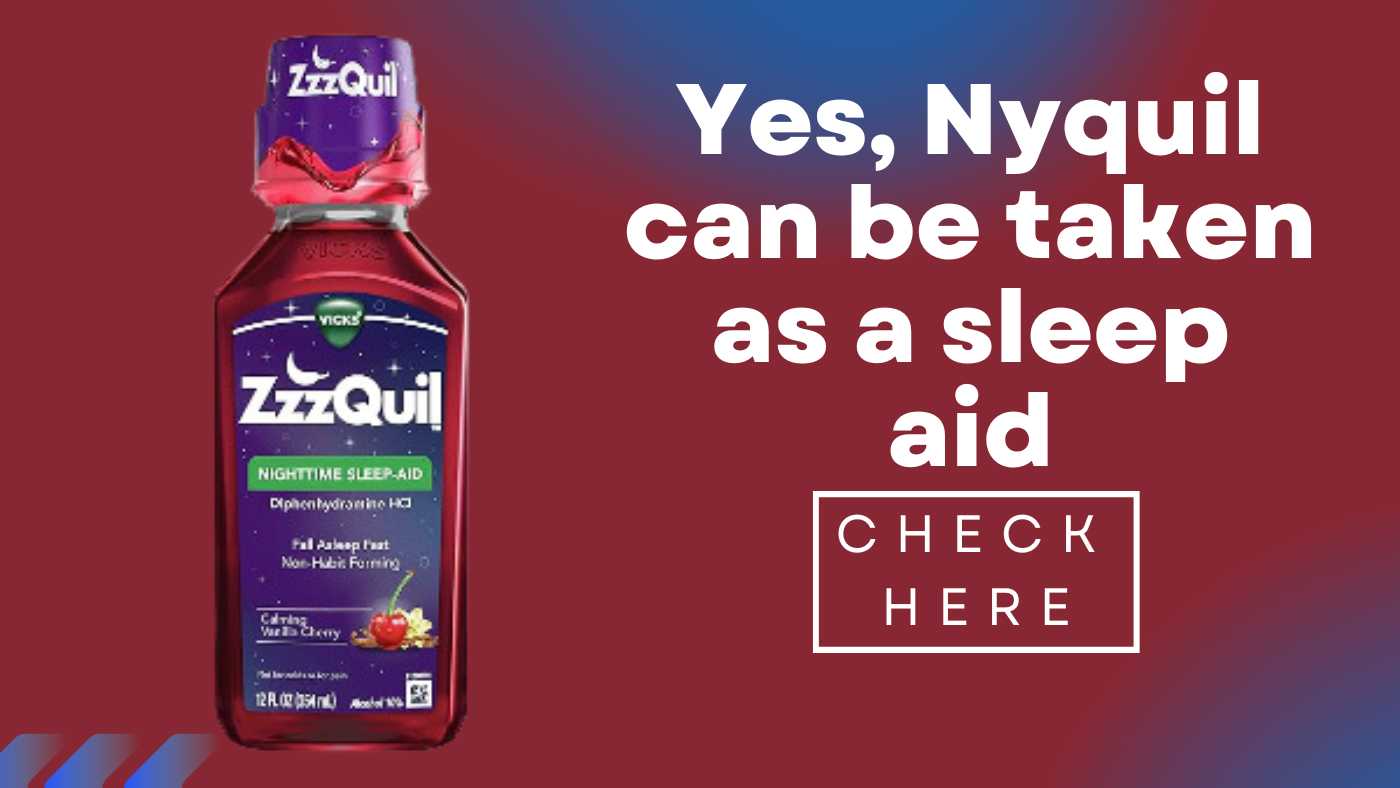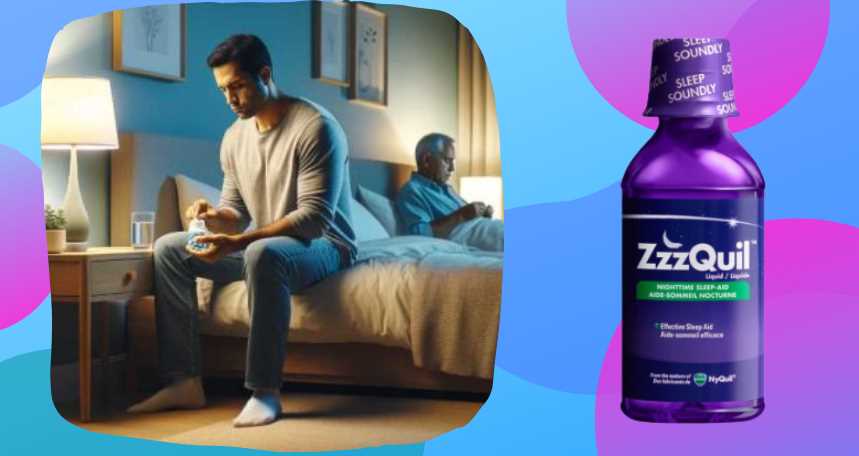Can you take nyquil as a sleep aid? Yes, Nyquil can be taken as a sleep aid. It contains ingredients that promote drowsiness, so many individuals turn to it when seeking a sleep aid.

Can You Take NyQuil as a Sleep Aid? Understanding the Risks and Benefits
You can take Nyquil as a sleep aid, but it is not recommended for regular use solely for this purpose due to potential side effects and the risk of developing dependence.
No products found.
Nyquil is an over-the-counter medication primarily used to relieve symptoms of the common cold and flu, such as cough, sore throat, headache, minor aches and pains, fever, runny nose, and sneezing. It contains several active ingredients, including:
- Acetaminophen: Pain reliever and fever reducer.
- Dextromethorphan: Cough suppressant.
- Doxylamine succinate: Antihistamine that can cause drowsiness.
Doxylamine succinate is the component responsible for the sedative effect, which may help induce sleep. However, using Nyquil regularly as a sleep aid is not advisable for several reasons:
- Potential for Dependence: Regular use can lead to dependence on the medication to fall asleep.
- Side Effects: Nyquil can cause side effects such as dry mouth, dizziness, and urinary retention. Long-term use of acetaminophen can lead to liver damage.
- Masking Underlying Issues: Using Nyquil as a sleep aid may mask underlying sleep disorders that require medical attention.
For occasional use, Nyquil may help you fall asleep if you have a cold or flu. Still, it’s better to consider lifestyle changes or consult a healthcare provider for safer alternatives for long-term sleep issues.
| Statistic | Value |
|---|---|
| Percentage of Adults Using Nyquil for Sleep | 5-10% (estimated) |
| Common Side Effects Reported | Drowsiness (20%), Dry Mouth (15%), Dizziness (10%) |
| Cases of Acetaminophen Overdose per Year (US) | Approximately 50,000 |
| Liver Damage Cases Linked to Acetaminophen | 2,000 – 3,000 annually |
| Recommended Maximum Duration for Nyquil Use | 7-10 days |
Using medications like Nyquil responsibly and seeking professional advice for persistent sleep problems is essential.
However, it’s important to note that Nyquil is not intended to be used as a long-term solution for insomnia or other sleep disorders. As with any medication, it’s advisable to consult with a healthcare professional before using Nyquil or any sleep aid regularly.
Understanding Nyquil
When it comes to using Nyquil as a sleep aid, you might be wondering if it is safe and effective. Nyquil is a common over-the-counter medication often used to relieve cold and flu symptoms. However, it is not specifically designed as a sleep aid and should not be used for prolonged periods to help with sleep.
What Is Nyquil?
Nyquil is a combination medication that typically contains ingredients such as acetaminophen, dextromethorphan, doxylamine succinate and/or pseudoephedrine. Each of these ingredients has different intended purposes, such as pain relief, cough suppression, and decongestion.
Ingredients Of Nyquil:
| Ingredient | Purpose |
|---|---|
| Acetaminophen | Pain relief |
| Dextromethorphan | Cough suppression |
| Doxylamine succinate | Sleep aid |
| Pseudoephedrine | Decongestant |
Intended Use Of Nyquil:
Nyquil is intended to temporarily relieve symptoms associated with cold and flu, such as cough, congestion, and pain. The doxylamine succinate ingredient in Nyquil may cause drowsiness, which could help you fall asleep faster. However, it is important to note that Nyquil is not intended to be used as a long-term sleep aid. If you are experiencing ongoing sleep issues, it is advisable to consult with a healthcare professional.

Credit: leafydoc.com
Nyquil As A Sleep Aid
Nyquil is a common over-the-counter remedy for cold and flu symptoms, but it is not specifically designed as a sleep aid. While it may help you fall asleep initially, it can also cause grogginess and drowsiness the next day. It is best to consult with a healthcare professional for appropriate sleep aid options.
Can You Take Nyquil As a Sleep Aid
Nyquil as a Sleep Aid
The sedating effects of Nyquil are often sought by individuals who have difficulty sleeping. Nyquil contains active ingredients like doxylamine succinate, an antihistamine that causes drowsiness. People try using Nyquil as a sleep aid because of its sedative properties, hoping to achieve a better night’s sleep. However, it’s important to note that Nyquil is not specifically formulated as a sleep aid but is primarily intended to relieve cold and flu symptoms.
Using Nyquil as a sleep aid has several side effects, such as drowsiness and grogginess the next day. It’s also essential to follow the recommended dosage instructions and avoid using Nyquil for prolonged periods or with other medications. If you’re struggling with sleep issues, it’s best to consult with a healthcare professional to determine the most appropriate treatment for your specific needs.
Why People Use Nyquil as a Sleep Aid
Nyquil is sought after as a sleep aid because of its sedating effects, but it’s important to recognize that it’s not formulated specifically for sleep. Using Nyquil for this purpose can lead to side effects and may not address the root cause of sleep issues. Consulting with a healthcare professional is advised for appropriate sleep remedies.
Potential Risks And Side Effects
Can You Take Nyquil as a Sleep Aid? There are potential risks and side effects.
Due to its sedative effects, Nyquil is commonly used as a sleep aid. However, it is important to be aware of the potential risks and side effects associated with its use. One of the main concerns is the drowsiness after taking Nyquil. This can lead to impaired performance, making activities that require alertness, such as driving or operating machinery, dangerous.
It’s also crucial to consider Nyquil’s interactions with other medications. Nyquil contains ingredients like acetaminophen, which can interact with certain prescription drugs, causing serious health issues. Always consult with a healthcare professional before combining medications.
Additionally, regular use of Nyquil as a sleep aid could have long-term effects. The active ingredient, diphenhydramine, is not intended for prolonged usage and may lead to dependency or other adverse reactions if used continuously.
Is it safe to use Nyquil regularly for sleep?
Using Nyquil regularly for sleep is not safe. Regular use can lead to dependence and potential side effects from its active ingredients. Finding a safer, long-term solution for sleep problems is important rather than relying on a medication intended for cold and flu relief.
What are the side effects of using Nyquil as a sleep aid?
Potential side effects of using Nyquil as a sleep aid include dizziness, drowsiness, dry mouth, blurred vision, and constipation. Long-term use can also lead to liver damage due to the acetaminophen content. It’s crucial to use Nyquil only as directed and not for purposes other than intended.
What are the alternatives to Nyquil for sleep?
There are several alternatives to Nyquil for sleep, including:
| Alternative | Description |
|---|---|
| Melatonin | A natural hormone that regulates sleep-wake cycles, available as a supplement. |
| Diphenhydramine | An antihistamine found in over-the-counter sleep aids like Benadryl. |
| Valerian Root | An herbal supplement that may help improve sleep quality. |
| Chamomile Tea | A natural remedy known for its calming effects. |
| Sleep Hygiene Practices | Techniques include maintaining a regular sleep schedule, creating a restful environment, and avoiding caffeine and electronics before bed. |
What precautions should be taken when using sleep aids?
When using sleep aids, consider the following precautions:
- Consult a Doctor: Before starting any new sleep aid, talk to your healthcare provider, especially if you have underlying health conditions or are taking other medications.
- Follow Dosage Instructions: Always adhere to the recommended dosage on the label or as your doctor prescribes.
- Avoid Long-Term Use: Many sleep aids are intended for short-term use. Prolonged use can lead to dependency and reduced effectiveness.
- Watch for Side Effects: Be aware of potential side effects and contact your healthcare provider if you experience any adverse reactions.
- Consider Non-Medical Approaches: Explore lifestyle changes and behavioral therapies that can improve sleep without medication.
Can lifestyle changes improve sleep without medication?
Yes, lifestyle changes can significantly improve sleep quality without needing medication. Some effective strategies include:
- Maintaining a Regular Sleep Schedule: Go to bed and wake up simultaneously every day, even on weekends.
- Creating a Relaxing Bedtime Routine: Before bed, engage in calming activities such as reading or taking a warm bath.
- Optimizing the Sleep Environment: Keep your bedroom cool, dark, and quiet. Invest in a comfortable mattress and pillows.
- Limiting Caffeine and Alcohol: Avoid consuming caffeine or alcohol close to bedtime as they can disrupt sleep.
- Reducing Screen Time: Limit exposure to screens from phones, tablets, and computers at least an hour before bed.
When should you seek medical help for sleep problems?
If you have persistent sleep problems lasting more than a few weeks, seeking medical advice is important. Chronic insomnia or other sleep disorders can have serious health implications, and a healthcare provider can help identify underlying causes and recommend appropriate treatments.
Are there any natural remedies for sleep?
Yes, several natural remedies can help promote sleep, including:
- Herbal Teas: Chamomile, lavender, and peppermint teas can have calming effects.
- Essential Oils: Aromatherapy with essential oils like lavender or eucalyptus can help relax the mind and body.
- Magnesium Supplements: Magnesium can help relax muscles and improve sleep quality.
- Yoga and Meditation: Practices that promote relaxation and reduce stress can improve sleep patterns.
Final Thought
In a nutshell, while Nyquil may help you fall asleep, it is not intended as a long-term sleep aid due to its potential side effects and addictive properties. It is crucial to consult with a healthcare professional before using any medication as a sleep aid, as they can provide guidance on safer alternatives or recommend appropriate actions for better sleep hygiene.
Prioritizing a consistent sleep schedule, creating a restful environment, and practicing relaxation techniques can all contribute to a good night’s sleep without relying on medication.
